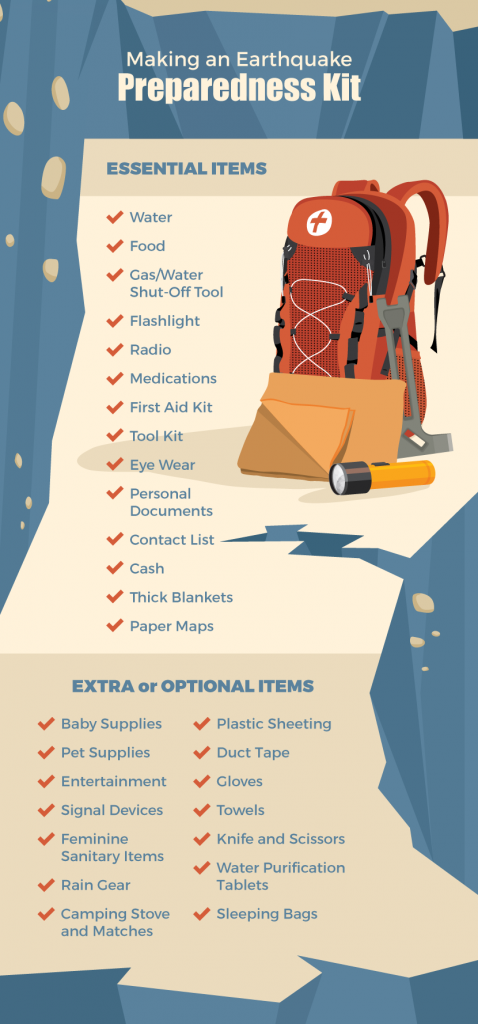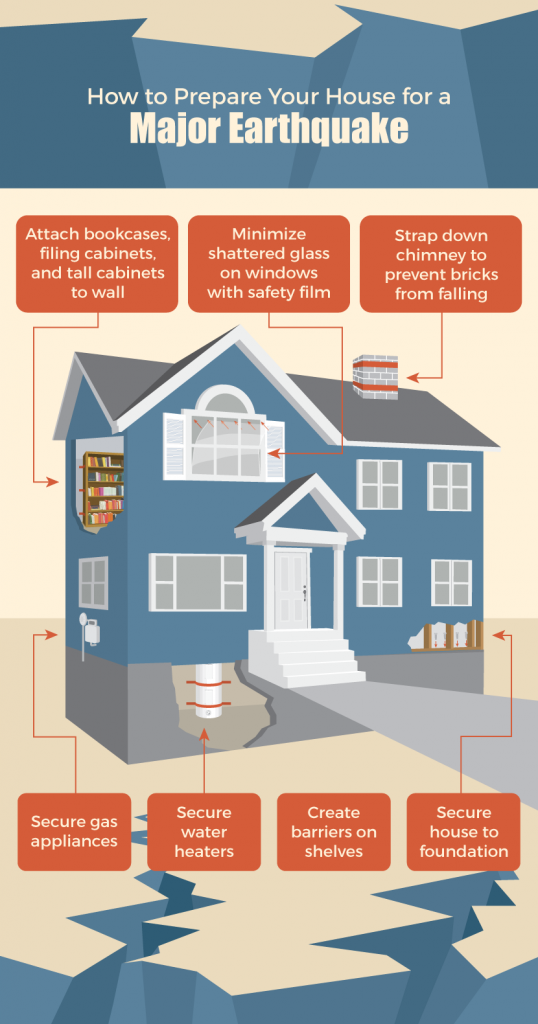Nobody wants to confront a major natural disaster. Yet some disasters – hurricanes, blizzards, and tornadoes, to name a few – come with warning signs, allowing for minor preparation and escape.
Earthquakes, on the other hand, happen immediately and with no warning. They are so all-consuming and widespread that you cannot jump in the car and escape them.
If you are in the impact zone, you will be affected. But the degree to which you are affected can be minimized. It all depends on how prepared you are for the quake. Preparation does take some time, but you will reap the benefits many times over in the event of a major earthquake.
What Is a Quake Like?
Ordinary life immediately precedes an earthquake. You are washing the dishes, watching TV, doing homework, or putting on a helmet for a bike ride. Then you feel that initial jolt.
You may not realize it at first, thinking that it is something else – that someone dropped something heavy. Then you become aware of the noises, of chandeliers rattling, the house frame squeaking, glasses dropping and breaking, car alarms going off.
If you are indoors, items that are not secured – books, TVs, glassware, and lamps – will topple and fall. Hanging items will begin to swing. As these things are falling, you become aware that you might just become the victim of one of these falling things.
If you are outdoors, trees sway and water sloshes out of swimming pools.
The first jerk is followed by several more back-and-forth jerks. You may find it hard to stand.
Even though most earthquakes last only seconds – rarely more than thirty seconds – it will feel like forever.
Right after the shaking stops, the noise continues: dogs barking, people shouting, alarms ringing. Milder aftershocks continue for minutes or hours. Your electricity has probably gone out. Water may not be safe to drink, or water mains may be broken. Gas lines may erupt.
You have just experienced an earthquake measuring 7.0 or greater on the Richter scale.1
Predicting Quakes
Unfortunately, no one can predict earthquakes. According to the U.S. Geological Survey (USGS), no scientists have ever predicted a major earthquake, nor are any scientists expected to be able to do so in the foreseeable future.
The best that scientists can do is produce tables that calculate the probability that an earthquake may occur. The milder the earthquake, the greater the probability that it will occur within the next 30 years. More severe quakes measuring 7.0 or higher on the Richter scale – those truly life-altering, disastrous quakes – are less probable to happen.
For example, because Southern California already experiences quakes between 5 and 6 on the Richter scale about four times per year, there is a 100 percent chance of another quake of similar strength happening within the next 30 years. However, because major magnitude-7.5 quakes have happened about once every 87 years, Southern California has only a 36 percent chance of another one happening in the next 30 years.2

Be Ready: Making an Earthquake Preparedness Kit
To help make your recovery from an earthquake safer and more comfortable, you should stock up your home with a set of essential preparedness items. Keep these items stored in a clean, dry place.3
Essential Items
- Water: One gallon per person for every day. Provide for a two-week supply of water.
- Food: Non-perishable items such as canned food or dry camping food that can be reconstituted with water. Be sure to have a can opener as well.
- Gas/Water Shutoff Tool: This specialized wrench fits gas and water shutoff valves and can be purchased at your local home improvement or hardware store.
- Flashlight: Have both battery-powered and crank flashlights. Keep a full set of fresh batteries on hand, too.
- Radio: Purchase a hand-crank radio.
- Medications: These are essential daily prescription items that are needed to maintain regular health.
- First-Aid Kit: Basic kit that has gauze, adhesive bandages, antiseptic, aspirin or ibuprofen, and heat packs.
- Tool Kit: Small tool kit with screwdrivers, pliers, and a hammer. If you wish, you may substitute a multipurpose tool.
- Eyewear: Extra glasses, contact lenses, and solution.
- Personal Documents: Assemble a fireproof lockbox with prescription slips, home and car titles, birth certificates, passports, and all insurance policies, including homeowner’s insurance policy.
- Contact List: Written spreadsheet or other type of list of phone numbers and addresses of relatives, close associates, local hospitals, and police and fire stations.
- Cash: Several hundred dollars in small bills.
- Thick Blankets
- Paper Maps: Detailed maps of your local area.
Extra or Optional Items
- Baby Supplies: Bottles, formula, diapers, food.
- Pet Supplies: Food, ID, collar, carrier.
- Entertainment: Books, cards, board games.
- Signal Devices: Whistle, air horn, flares.
- Feminine Sanitary Items
- Rain Gear
- Camping Stove: Stove with extra propane canisters and waterproof matches.
- Plastic Sheeting
- Duct Tape
- Gloves
- Towels
- Knife and Scissors
- Water Purification: Tablets or bleach.
- Sleeping Bags

How to Make Your Home Safer in Case the Big One Strikes
Chances are good that your home is not prepared for an earthquake. While your house may seem solid and safe, it is likely not ready for the rigors of a magnitude-7.0 earthquake. Undertake these projects now for a safer home:4
Secure Water Heaters
Secure heaters to walls with metal straps. These bands can be purchased as part of a kit, available at home improvement stores.
Attach Bookcases, Filing Cabinets, and Tall Cabinets to Wall
Affix any kind of furniture that can tip over to a wall stud, using a metal L-brace or a nylon strap.
Create Barriers on Shelves
Attach ledge barriers along the edges of shelves to prevent items from sliding off and falling.
Secure Gas Appliances
Attach flexible connections to allow appliances to shift without breaking their lines. As with the water heater, attach large gas appliances to the nearest wall.
Minimize Shattered Glass on Windows
Install clear or shaded safety film on windows. This will prevent glass from scattering across the floor.
Secure House to Foundation
Consult a contractor to install anchor bolts between the house framing and the foundation.
Strap Down Chimney
Attach reinforcing bars or metal straps to the chimney to prevent it from snapping and breaking off in the event of an earthquake.

During and After an Earthquake: Keeping Yourself and Your Family Safe
During The Quake5
DO:
- Drop to the ground and take cover under the nearest strong piece of furniture, like a table or desk.
- Stay indoors. Even though open outdoor spaces are safer than being indoors, falling objects can injure you as you try to move outside.
- If you are driving, stop at the nearest clear, open area, away from buildings. Remain in the car.
DO NOT:
- Stand under a door frame. Once standard advice, this is now outdated, as modern door frames are rarely stronger than other parts of the house.
- Stand next to buildings, trees, or power lines, which could collapse and injure you.
- Go to a window, as glass may break and hurt you.
- Stand next to book cases, high pantry cabinets, refrigerators, or other top-heavy items that may fall.
After The Quake
Even though the earthquake may last only seconds, the aftermath may go on for days or weeks to come. Follow these fifteen steps, in this order:
- Wait for the aftershocks to end.
- Check yourself for injuries first before assisting others.
- Put on shoes to protect yourself against broken glass.
- Check for fires and extinguish them immediately.
- Shut off natural gas and water lines.
- Move yourself and your family to the nearest open area.
- Open windows to ventilate your home.
- Check your house for structural damage.
- Begin gathering water from the water heater release valve, ice cube trays, and toilet tanks.
- Check sewer lines for damage before flushing the toilet.
- Inspect the chimney for cracks that may indicate potential collapse.
- Keep the freezer closed for as long as possible to retain the cold.
- Set up charcoal grill outside for cooking.
- Stay at home if at all possible. Roads will be impassable.
- Check your emergency radio for information.
Earthquakes are devastating events. Fortunately, you and your family can remain safe by following basic safety plans.

Source: Fix.com Blog
Sources:
- How Long Earthquakes Last – http://quake.utah.edu/regional-info/earthquake-faq
- Earthquake Probability – https://pubs.usgs.gov/fs/2015/3009/pdf/fs2015-3009.pdf
- Red Cross Earthquake Preparedness Kit – http://www.redcross.org/get-help/prepare-for-emergencies/be-red-cross-ready/get-a-kit
- 6. Prepare House for Earthquake – http://www.military.com/money/home-ownership/maintaining-your-home/tips-to-make-home-earthquake-ready.html
- Quake: Do This / Do Not Do This – http://www.nationalgeographic.com/environment/natural-disasters/earthquake-safety-tips/

![]()






